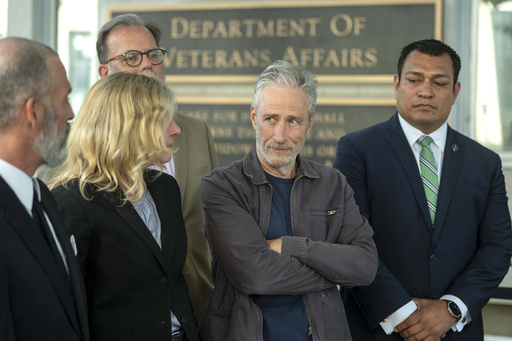Comedian Jon Stewart and K2 veterans left a meeting at the Department of Veterans Affairs frustrated on Friday after being informed that they would have to wait for a decision on connecting their illnesses to the toxic base where they were deployed following 9/11. Despite the PACT Act, signed by President Joe Biden in 2022 to address denied claims, the bill did not include uranium exposure, leaving some of the initial troops deployed post-9/11 still grappling with health issues.
K2, a former Soviet base in Uzbekistan, where troops were stationed after 9/11, was found to be contaminated with yellow powdered uranium, leading to radiation exposure levels up to 40,000 times higher than natural levels. Even two decades later, veterans who served at K2 are struggling to have their radiation-related illnesses recognized by the VA, with many dying young.
At a meeting with VA Secretary Denis McDonough, hopes for resolving the issue were raised, but veterans were informed that a decision was pending further information. The VA is currently considering covering specific K2 illnesses and radiation exposure, with more than 300 conditions already covered under the PACT Act.
The delayed recognition of uranium exposure at K2 has left many veterans, such as Kim Brooks, who lost her husband, Lt. Col. Tim Brooks, to brain cancer after his service at K2, feeling frustrated and disappointed. Tim collapsed during a ceremony in 2003 and was diagnosed with brain cancer, eventually passing away at 36. Efforts to obtain records confirming exposure have been challenging for veterans and their families due to classification.
The Pentagon, headed by Defense Secretary Lloyd Austin, has acknowledged the health issues faced by K2 veterans and the obligation to care for them. The confusion surrounding the type of uranium present at K2 has hindered veterans from receiving adequate care, despite elevated radiation levels documented as harmful regardless of the specific type of uranium.
Approximately 15,000 troops were deployed to K2 from 2001 to 2005, with over 5,000 contacted by a veterans’ organization, reporting around 1,500 serious medical conditions, including cancers, kidney problems, and reproductive issues. Recognition of radiation-related illnesses by the VA is crucial for veterans seeking medical coverage and acknowledgment of their exposure.
Former Army Staff Sgt. Mark Jackson, who suffers from severe health issues linked to his time at K2, stressed the importance of recognition for exposure beyond medical treatment. With Defense Secretary Austin now leading the agency responsible for recognizing K2 radiation exposure, veterans like Jackson and Kim Brooks hope for acknowledgment and support for their ongoing health struggles.


